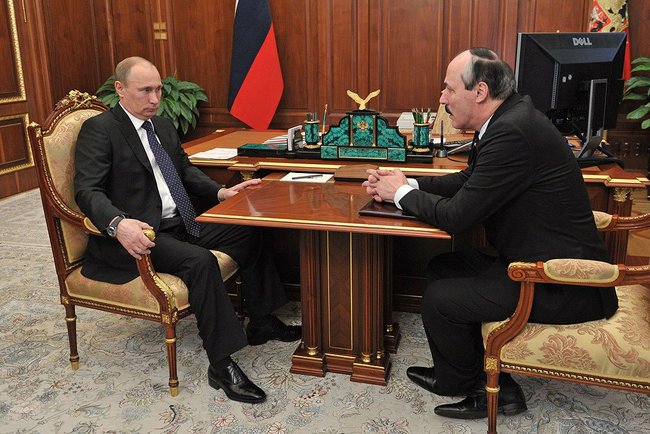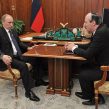
So Far, New Dagestani President’s Reforms Appear to Bring More Violence
Publication: Eurasia Daily Monitor Volume: 10 Issue: 173
By:

On September 25, Dagestani Supreme Court Judge Mukhtar Shapiev was killed in Makhachkala. Two assailants shot the judge and his son near the entrance to their apartment block in the republican capital. Shapiev only oversaw civil cases, so he did not have the government protection normally provided to judges in Dagestan. Until 2011, Shapiev served as prosecutor in the republic’s Sergokala district. Therefore, investigators say he may have been killed for his activities as a judge or as a prosecutor. This was the second killing of a judge in Dagestan: Supreme Court Judge Magomed Magomedov was killed in Makhachkala in January, while Akhmed Rajabov, a federal judge, was killed in March in the city of Izberbash, about 37 miles south of Makhachkala. According to investigators, all three Dagestani judges were killed for their professional activities (https://www.gazeta.ru/social/2013/09/26/5669781.shtml).
The situation in Dagestan has been tense in recent months as Ramazan Abdulatipov, the new Dagestani leader appointed by Moscow, vowed to root out the insurgency in the republic. At the Valdai forum in September, Abdulatipov stated that there were 150–250 insurgents in the republic and that 2 percent of them were foreign mercenaries. “We are fighting the extremists, bandits, in an old-fashioned way as in the times of Imam Shamil,” Abdulatipov said. “When they come out of the forest, we run after them, when they go back to the forest to rest, we also rest. This should not be the case; there are modern technologies and techniques and thus enormous opportunities for fighting banditry, terrorism, etc.” (https://ria.ru/incidents/20130919/964288969.html#ixzz2gDTteig7). Abdulatipov, deliberately or not, equated himself with the Russian imperial army that mercilessly fought the North Caucasian resistance movement, headed by Imam Shamil, an ethnic Avar, in the 19th century. This attitude is likely to have reverberations for Abdulatipov’s political future in Dagestan, where Imam Shamil is widely revered as a national hero.
Abdulatipov’s appointment has been accompanied by a hardening of Russian policies against suspected insurgents. President Vladimir Putin proposed confiscating the property of relatives of insurgents if there is proof they materially benefited from terrorism (https://kommersant.ru/doc/2307965?fb_ref=fb). Even though this formula seems to be legally logical and plausible, past practice suggests the law enforcement agencies will simply confiscate the property of relatives of insurgents with little regard for actual proof. So, the Kremlin’s new proposals essentially strive to institutionalize the practice of collective punishment that has been in place in the North Caucasus for quite some time. The institutionalization of such practices both will lead to their wider applicability across the region, as well as the rise of a system of authority that openly declares war on wider circles of the society.
Given his self-proclaimed status as a Russian henchman in Dagestan, Abdulatipov’s policies have resulted in a series of incidents in the republic in recent weeks and months. On September 28, a driver in the city of Kizilyurt refused a police order to stop and fired shots at the servicemen; he was killed by return fire. That same day, a police officer was killed in a car-chase incident in the city of Khasavyurt. Also on September 28, one police officer was killed and four were wounded in an armed clash in the central part of Makhachkala. One of the wounded officers died in the hospital the next day (https://www.kavkaz-uzel.ru/articles/230807/).
Meanwhile, suicide attacks have resurfaced in the republic. On September 23, a suicide bomber attacked a police station in the village of Khuchni in Dagestan’s Tabasaran district. Two people were killed and 12 sustained injuries in the incident. On September 24, police killed two suspected militants near the village of Erpeli in Dagestan’s Buinaksk district. On September 25, police killed two suspected militants in Makhachkala, including a leader of the Kadar militant group (RIA Novosti, September, 25–28). On September 27, the police killed five suspected militants in the city of Derbent in southern Dagestan. Among the slain suspects was a rebel leader, Sharif Akhmedov, and his wife, Dinara Eskendorova. Akhmedov reportedly had organized the suicide attack in Khuchni (https://www.kavkaz-uzel.ru/articles/230729/).
Meanwhile, Ramazan Abdulatipov’s newly founded regime has been undergoing significant transformations since January, when he was appointed as Dagestan’s interim president. In September, Abdulatipov was confirmed as Dagestan’s president by the Kremlin’s appointment procedure. On September 26, the Dagestani parliament voted to give up one of the last symbolic vestiges of republican autonomy, the title of “president” for the head of the republic. Starting next year, the leader of Dagestan will be called the “head” of the republic, instead of “president” (RIA Novosti, September 26).
Having been dispatched by Moscow to Makhachkala to improve the security situation in Dagestan and ultimately increase Moscow’s control over the republic, Abdulatipov has managed to increase the presence of the Russian security services and the military there. The Moscow appointee also launched an offensive against corrupt officials. However, Abdulatipov has a very limited social base in the republic to wield any long-term reforms there without antagonizing local elites. On September 26, Abdulatipov once again pleaded with Dagestani parliamentary deputies to start purging the republican police and other law enforcement agencies. Abdulatipov lamented the poor results of their counter-insurgency campaign. “There is no prevention work, practically no operative work, no undercover agent work,” he said. “Apart from the FSB [Federal Security Service], no one works effectively in this direction” (https://ria.ru/incidents/20130926/966031965.html#ixzz2gDie9B9y).
Abdulatipov’s failure to create his own team of reformers was most vividly manifested on September 23, when Gaji Makhachev was appointed as the republic’s deputy prime minister (https://www.regnum.ru/news/1711138.html). Makhachev has been one of the most powerful and controversial figures in Dagestani politics in the past 20 years. He jump-started his political career as one of the informal leaders of the largest ethnic group in Dagestan, the Avars. Later, he was coopted by the Russian government, but always had the dubious reputation of a semi-warlord.
Abdulatipov has demonstrated that while he, unlike any other of his recent predecessors, is perhaps well controlled by Moscow, he cannot control Dagestan, so he has to rely on regional strongmen. This essentially means that Moscow’s attempt to establish greater direct control over Dagestan is transforming the republic in a way that does not necessarily increase Moscow’s influence in the region, but simply reshuffles the powerful politicians and causes a rise in tensions.




